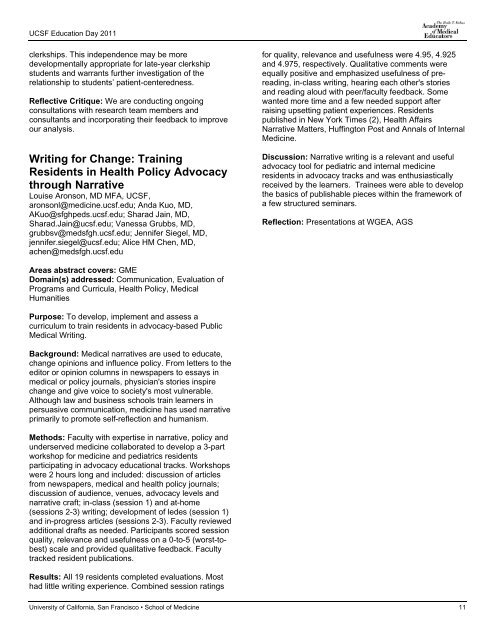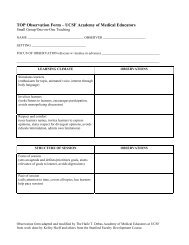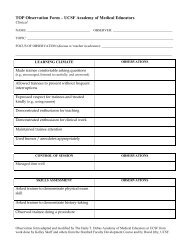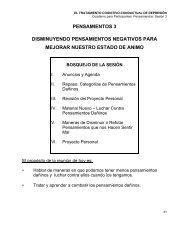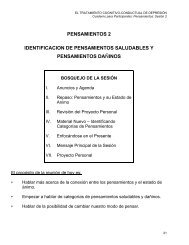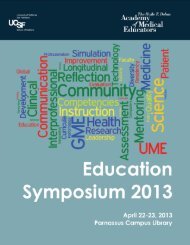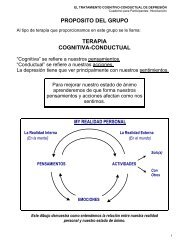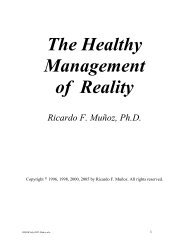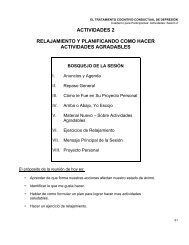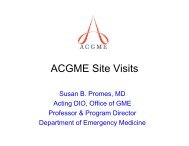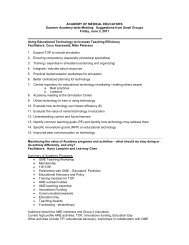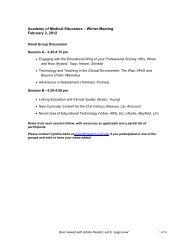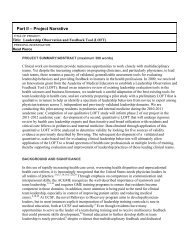2011 - UCSF School of Medicine - University of California, San ...
2011 - UCSF School of Medicine - University of California, San ...
2011 - UCSF School of Medicine - University of California, San ...
You also want an ePaper? Increase the reach of your titles
YUMPU automatically turns print PDFs into web optimized ePapers that Google loves.
<strong>UCSF</strong> Education Day <strong>2011</strong>clerkships. This independence may be moredevelopmentally appropriate for late-year clerkshipstudents and warrants further investigation <strong>of</strong> therelationship to students’ patient-centeredness.Reflective Critique: We are conducting ongoingconsultations with research team members andconsultants and incorporating their feedback to improveour analysis.Writing for Change: TrainingResidents in Health Policy Advocacythrough NarrativeLouise Aronson, MD MFA, <strong>UCSF</strong>,aronsonl@medicine.ucsf.edu; Anda Kuo, MD,AKuo@sfghpeds.ucsf.edu; Sharad Jain, MD,Sharad.Jain@ucsf.edu; Vanessa Grubbs, MD,grubbsv@medsfgh.ucsf.edu; Jennifer Siegel, MD,jennifer.siegel@ucsf.edu; Alice HM Chen, MD,achen@medsfgh.ucsf.edufor quality, relevance and usefulness were 4.95, 4.925and 4.975, respectively. Qualitative comments wereequally positive and emphasized usefulness <strong>of</strong> prereading,in-class writing, hearing each other's storiesand reading aloud with peer/faculty feedback. Somewanted more time and a few needed support afterraising upsetting patient experiences. Residentspublished in New York Times (2), Health AffairsNarrative Matters, Huffington Post and Annals <strong>of</strong> Internal<strong>Medicine</strong>.Discussion: Narrative writing is a relevant and usefuladvocacy tool for pediatric and internal medicineresidents in advocacy tracks and was enthusiasticallyreceived by the learners. Trainees were able to developthe basics <strong>of</strong> publishable pieces within the framework <strong>of</strong>a few structured seminars.Reflection: Presentations at WGEA, AGSAreas abstract covers: GMEDomain(s) addressed: Communication, Evaluation <strong>of</strong>Programs and Curricula, Health Policy, MedicalHumanitiesPurpose: To develop, implement and assess acurriculum to train residents in advocacy-based PublicMedical Writing.Background: Medical narratives are used to educate,change opinions and influence policy. From letters to theeditor or opinion columns in newspapers to essays inmedical or policy journals, physician's stories inspirechange and give voice to society's most vulnerable.Although law and business schools train learners inpersuasive communication, medicine has used narrativeprimarily to promote self-reflection and humanism.Methods: Faculty with expertise in narrative, policy andunderserved medicine collaborated to develop a 3-partworkshop for medicine and pediatrics residentsparticipating in advocacy educational tracks. Workshopswere 2 hours long and included: discussion <strong>of</strong> articlesfrom newspapers, medical and health policy journals;discussion <strong>of</strong> audience, venues, advocacy levels andnarrative craft; in-class (session 1) and at-home(sessions 2-3) writing; development <strong>of</strong> ledes (session 1)and in-progress articles (sessions 2-3). Faculty reviewedadditional drafts as needed. Participants scored sessionquality, relevance and usefulness on a 0-to-5 (worst-tobest)scale and provided qualitative feedback. Facultytracked resident publications.Results: All 19 residents completed evaluations. Mosthad little writing experience. Combined session ratings<strong>University</strong> <strong>of</strong> <strong>California</strong>, <strong>San</strong> Francisco • <strong>School</strong> <strong>of</strong> <strong>Medicine</strong> 11


